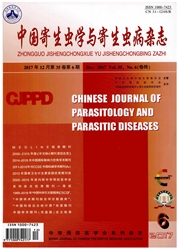

 中文摘要:
中文摘要:
采集2010年6月~2011年8月云南西部两个地州(大理、德宏)的HIV阳性者(927份)血清和HIV阴性者(80份)血清,用ELISA法检测血清中弓形虫IgG抗体。结果显示,两地区HIV阳性者和HIV阴性者的弓形虫特异性抗体IgG阳性率分别为35.1%(325/927)和23.8%(19/80)。HIV阳性血清的检测结果显示,德宏州和大理州的阳性率分别为30.3%(178/588)和43.4%(147/339);各民族间的弓形虫IgG阳性率之间的差异有统计学意义(χ2=28.433,P〈0.05);不同年龄组的阳性率差异无统计学意义(χ2=4.248,P>0.05),41~60岁阳性率最高(36.1%,103/285);但不同性别间[男性(35.6%,203/571)、女性(34.3%,122/356)]的差异无统计学差异(χ2=0.158,P>0.05)。
 英文摘要:
英文摘要:
Serum samples were collected from HIV positive cases (927) and HIV negative ones (80) from June 2010 to August 2011 in Dali and Dehong Prefectures of Yunnan. Serum anti-Toxoplasma gondii IgG was detected by ELISA. The overall anti-Toxoplasma gondii IgG positive rate among HIV positive cases and HIV negative ones was 35.1% (325/927) and 23.8% (19/80), respectively. In HIV positive cases, the seropositive rate was 30.3% (178/588) in Dali and 43.4% (147/339) in Dehong. The seropositive rate was significantly different among ethnic groups (χ2=28.433, P〈0.05). No significant difference was found among age groups(χ2=4.248,P〉0.05), and the age group of 41-60 showed the highest positive rate (36.1%, 103/285). The seropositive rate was 35.6%(203/571) in males and 34.3% (122/356) in females (χ2=0.158,P〉0.05).
 同期刊论文项目
同期刊论文项目
 同项目期刊论文
同项目期刊论文
 期刊信息
期刊信息
